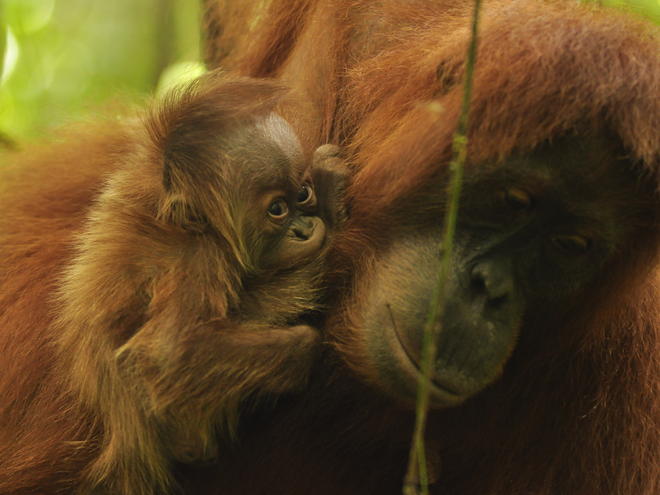Arrival of baby orangutan is a symbol of hope for conservation in Sumatra
Published by the World Wildlife Fund
One of the last great stands of rain forest in the deforestation hotspot of the Indonesian island of Sumatra has welcomed an exciting new addition: a baby female orangutan. The infant is the first orangutan born in the Thirty Hills conservation concession since WWF and its partners began managing the 100,000-acre forest in 2015.
Violet, one of dozens of orangutans reintroduced into Bukit Tigapuluh National Park—a region commonly known as Thirty Hills—is the new mother, and both mom and baby appear healthy. The Frankfurt Zoological Society (FZS), an international conservation organization committed to preserving wild lands and animals, has worked to reintroduce orangutans like Violet into Thirty Hills since 2001.
Most of the orangutans were rescued from the illegal pet trade and placed in the society’s ‘jungle school.’ There, they learned the skills they need to survive before heading into the wild. Around 160 orangutans now live in Thirty Hills.
_MM.JPG?1479417045) © Frankfurt Zoological Society
© Frankfurt Zoological Society.JPG?1479417219) © Frankfurt Zoological Society
© Frankfurt Zoological SocietyA plan to save the ‘Emerald of the Equator’
Indonesia was once nicknamed the ‘Emerald of the Equator’ for the lush rain forests that spread across the country’s 17,000 islands. But the island of Sumatra, one of the most biodiverse places on the planet, has lost more than half of its forest cover in the last 30 years.
Still, stands of amazing, intact rain forest remain.
In 2015, WWF received a license to manage 100,000 acres of forest bordering Bukit Tigapuluh National Park that had originally been earmarked for logging concessions. We are working with FZS, The Orangutan Project, and indigenous forest-dwelling communities to restore parts of the land in Thirty Hills that had been deforested and protect animals from poaching and other harmful activities.
WWF and partners also work to maintain forest cover and connectivity between important forest blocks, which allows critically endangered Sumatran orangutans, tigers and elephants to disperse more widely and find food, habitat, and mates.
A symbol of hope
The birth of Violet’s daughter is an encouraging sign of our work in Thirty Hills. We’re committed to ensuring this spectacular forest and its wildlife survive long term.
Learn more about WWF’s work in Thirty Hills.
Read the full article at: http://feedproxy.google.com/~r/WWFStories/~3/gpbDCvW584k/arrival-of-baby-orangutan-is-a-symbol-of-hope-for-conservation-in-sumatra


.JPG?1479408930)
.JPG?1479416466)
